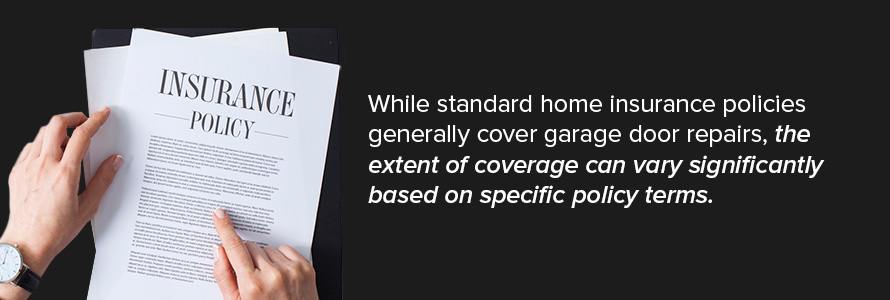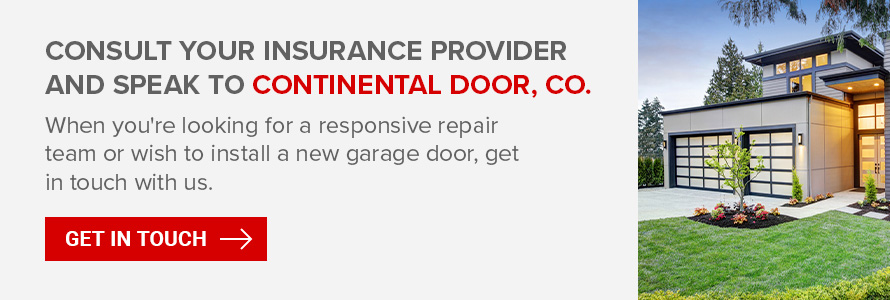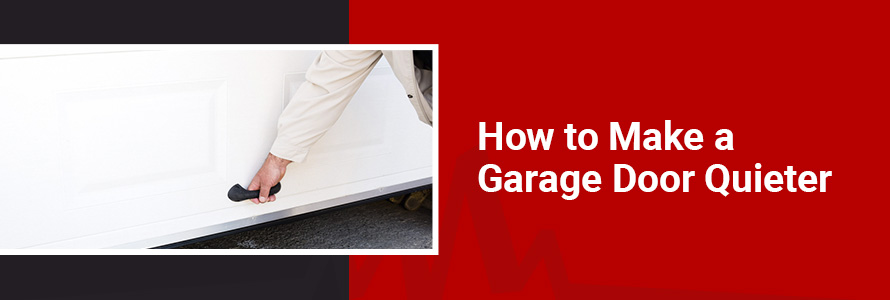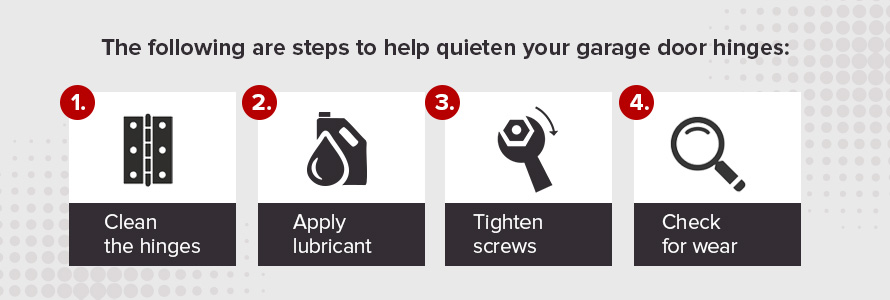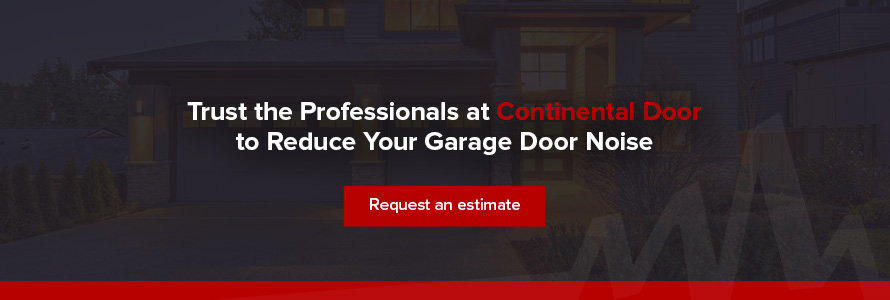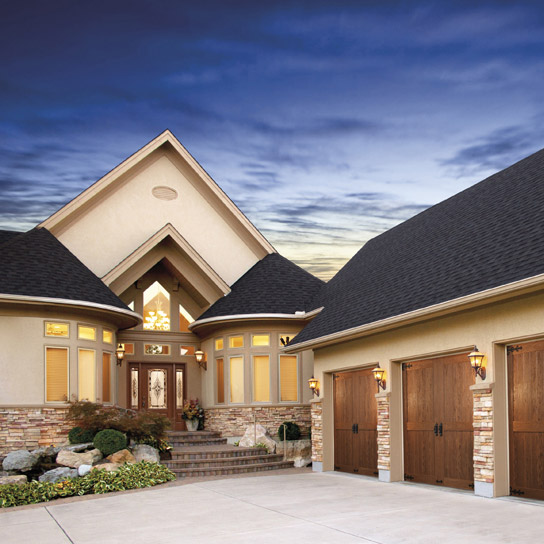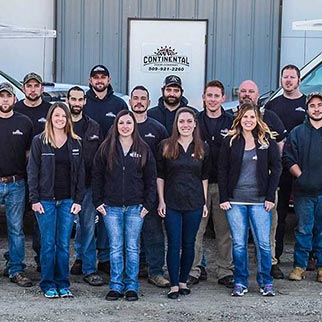Can You Paint Garage Doors?

Can you paint your garage door? Yes, but there are considerations.
A fresh coat can be the fastest way to restore the door’s shine or create a new look that complements your home’s exterior. Either way, painting your garage door is a small investment in time and money, which rewards you by enhancing your home’s curb appeal. If you want to repaint your garage door, our guide walks you through the considerations and tips for a successful project.
What Types of Garage Doors Can You Paint On?
Garage doors are made from various materials, from fiberglass and metal to solid wood. These materials have different characteristics and different painting needs. As a homeowner, you may have asked yourself, can you paint a metal garage door? What about vinyl?
Metal doors, for instance, need washing with trisodium phosphate (TSP) solution before sanding with fine-grit sandpaper to remove rust and peeling paint. Then, you’ll need to use a primer designed for metal, such as zinc-based primer and top it with oil-based paint. Wooden doors also require specific primers and sealants to cover cracks, prevent moisture and preserve the material.
Since different materials may require different primers and exterior paints, it’s best to check the manufacturer’s recommendation to ensure a quality outcome.
Things to Consider Before Painting Your Garage Door
Applying a new coat of paint to your garage door is one of the many maintenance tips that save you money in the long run. The paint serves as a protective layer that combats damage and degradation, preserving the door’s life span.
Here are things to consider to ensure a proper paint job:
- Type of door: Consider your door’s material to determine which primers and paints are compatible. Getting the right products for your paint job promotes adhesion and longevity.
- Condition of the door: It is crucial to assess the condition of your garage door before repainting. If it has damage or serious signs of wear, you should resolve that before applying a fresh coat. Wooden doors, for example, may have cracks, mold, termite infestation and even rot. Metal doors may have dents or corrosion. In such cases, call a technician for a professional inspection and repair before painting the door.
- Prepping needs: Before painting your garage door, go over the prepping steps. These may include pressure washing or scrubbing the door with a sponge to remove dirt, grime and chipping paint. Rough edges and old paint may need light sanding. Once you prime the door, allow enough time for the coat to dry before applying paint.
- Weather conditions: Extreme temperatures will impact how the paint dries and may cause premature flaking or fading. Watch the weather to choose a dry day that’s neither too cold nor too hot.
- Warranty terms: Check the manufacturer’s warranty before repainting your garage door. The manufacturer may have guidelines for applying cosmetics, and you may have to stick to a specific color range to avoid voiding your warranty.
How to Paint Garage Doors
Painting involves a few critical steps that require care and attention to bring out the door’s original shine. Since painting is one of the various garage door preventive maintenance strategies to ensure top shape, consider doing things right the first time by working with an expert. That said, here are steps to painting your garage door:
- Mix the paint: After your primer has dried, mix the paint in a bucket away from direct sunlight. Mix the paint thoroughly to get the right consistency and prevent separation.
- Paint the door panel: The bulk of the task is painting the panel, which is often split into multiple squares. You can paint with rollers or traditional brushes. Whichever method you use, keep track of the amount of paint that goes into individual squares to ensure the entire panel remains consistent in color.
- Paint the trim: The trim is a key part of your garage door, and painting it the same or a different color allows it to blend or contrast with the door.
- Paint the frame: The door frame can be just as tricky to paint as the stiles and rails. Pay attention to the frame for cohesive blending.
- Add another coat: Your garage door likely won’t need more than two coats of paint. However, make two the minimum so that you can achieve the most durable and seamless finish.
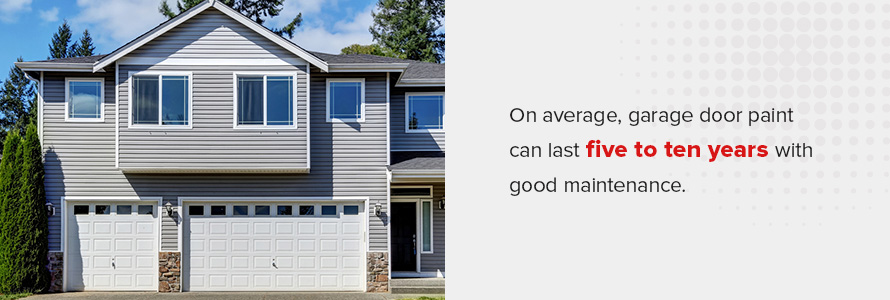
How Long Does a Garage Door Paint Last
A high-quality paint job on a proper surface should last just as long as the original paint. On average, garage door paint can last five to ten years with good maintenance. However, various factors impact the life span of a garage door paint job, such as:
- Surface preparation: A well-prepared surface is necessary for the paint to stick effectively.
- Paint quality: Top-quality paints from recognized brands are well-tested for durability and last longer than low-quality alternatives.
- Expertise: Skill is crucial to doing things properly. Consider professional services for long-term performance.
- Weather condition: Garage doors are exposed to the elements. In areas with severe weather, the paint may deteriorate sooner than usual.
- Maintenance: Proper maintenance is key to preserving the quality of your garage door paint.
Safety Considerations When Painting
Painting tasks like preparing the surface, sanding, filling and applying primer and paint can expose you to hazardous substances that may contribute to health issues. Exposure to substances such as metals, chemicals and fungi depends on the task, product and the level of precaution you take.
Since different products have different safety precautions, paying attention to the label for adequate care is important. Besides exposure to dangerous substances, there are safety measures for preventing physical harm. Review general painting safety measures to use products correctly and consider working with an expert rather than doing it solo.
When to Consider Replacing Your Garage Door
Your garage door is a prominent part of your home that plays a big role in its overall appearance. When should you consider replacing your garage door over repairs and cosmetic upgrades to ensure improved curb appeal?
If your garage door has served you for a decade or more, it may have performance issues and poor looks due to increased wear. While painting the door can restore its brilliance, it does not resolve the level of wear and tear or improve preexisting damage. In this case, a new door offers upgraded features, excellent appearance and the colors you prefer without sacrificing efficiency.
If you’re interested in changing the door’s material, a replacement is also best. For instance, instead of painting a garage door to look like wood, find a solid wood or premium faux wood material for a woodlike finish with much more robust features.
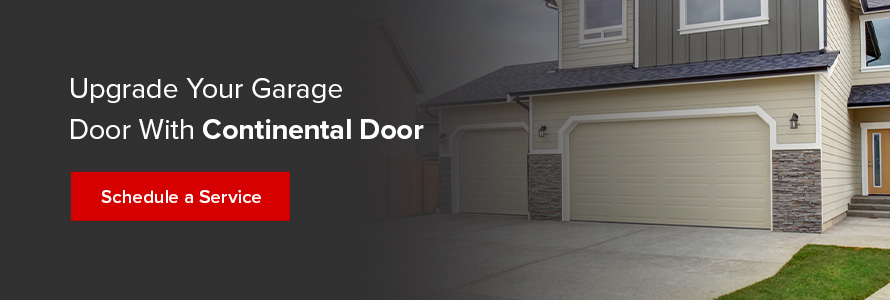
Upgrade Your Garage Door With Continental Door
For homeowners in the greater Spokane area, the warm summers offer the perfect opportunity to repaint their garage doors. Work with industry experts to ensure excellent quality, appearance and longevity. Continental Door is a garage door provider with expert technicians knowledgeable about different brands.
We provide professional painting and other residential maintenance services. We can also inspect the condition of your garage door and advise on quality replacement.
Schedule a service today to learn more!
Does Home Insurance Cover Your Garage Door?
Homeowners insurance does cover garage doors in some circumstances. As a homeowner, you want to ensure you’re prepared should you need to repair or replace your garage door. Discover the ins and outs of when home insurance may cover garage door damage.
Understanding Home Insurance and Garage Door Coverage
Garage doors are sometimes covered by home insurance. Explore when you’ll typically be covered and situations where your insurer may not cover the damage.
What Is Typically Covered?
These are some of the common instances where you are likely covered:
- Damage from windstorms, hail and lightning strikes: You are typically covered against weather-related perils like lightning strikes, hail and wind. Even so, it is a good idea to invest in a garage door that can withstand heavy winds and extreme weather.
- Fire damage: If a fire breaks out in your garage or home and damages the garage door, your policy usually covers the repair or replacement costs. Damage from soot and smoke is included.
- Break-ins: Break-ins that damage your garage door are generally covered by insurers.
- Vehicle damage: If a vehicle accidentally damages your garage door, your policy often covers the repair costs. Auto insurance may come into play in some scenarios, which we’ll cover in greater depth below.
Exceptions and Exclusions
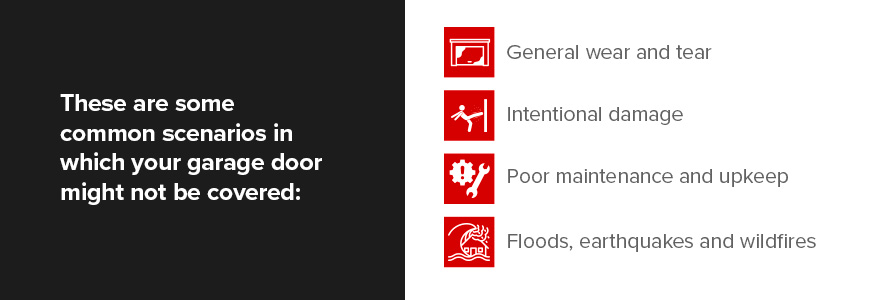
There are certain exceptions and exclusions to understand. Additionally, depending on how comprehensive your insurance is, specific damage may or may not be covered. These are some common scenarios in which your garage door might not be covered:
- General wear and tear: Damage caused by normal wear and tear is typically not covered by home insurance policies, and you will need to cover the repair expense.
- Intentional damage: If the insurer finds that the damage was caused intentionally by the homeowner or other residents, it is excluded from coverage.
- Poor maintenance and upkeep: If the damage is due to a lack of proper garage door maintenance and long-term neglect, your insurer will likely not cover the repairs.
- Floods, earthquakes and wildfires: Standard home insurance policies often exclude damage caused by certain natural disasters, such as floods, earthquakes and wildfires. You can usually add endorsements or separate policies to ensure you are covered in the event of such disasters.
A Closer Look at What Is and Isn’t Covered
Understanding the extent of your home insurance coverage is crucial. Explore some specific circumstances below.
Does Homeowners Insurance Cover Detached Garage Doors?
Detached garages often require separate coverage under an “other structures” policy because they are not attached to your home. Without one of these policies, damage to your detached garage might not be covered, and you would be responsible for covering the costs of repairs or full garage door replacement.
Attached garages are typically covered under your standard home insurance policy. However, you should always check your policy details to ensure you are adequately covered for either type of garage door.
Does Home Insurance Cover Garage Door Repairs?
While standard home insurance policies generally cover garage door repairs, the extent of coverage can vary significantly based on specific policy terms. Factors such as the type of damage, the cause and the policy’s coverage limits play crucial roles in determining how much the insurer will potentially pay out.
For instance, some policies may fully cover repairs and damage caused by falling trees or theft, while others might have exclusions or require higher deductibles. Additionally, certain policies might offer extra endorsements for enhanced protection.
It is essential to review your policy details and consult with your insurance provider to understand the exact terms and extent of your coverage.
Does Home Insurance Cover Garage Door Springs?
Home insurance generally covers garage door springs if the damage was due to a covered peril, such as fire or theft. However, damage from general wear and tear or poor maintenance is typically not covered. To be sure, check your policy’s specific details.
Does Car Insurance Cover Hitting a Garage Door?
If you accidentally hit your garage door with your car, your homeowners insurance policy will typically cover the damage done to the door. If you have collision coverage, you can likely use it to cover the damage to your vehicle. However, in some circumstances, auto insurance can cover damage to garage doors. For example, if someone else’s vehicle hits your garage door, their liability car insurance should cover the damage.
Filing a Claim for Garage Door Damage
Knowing how to file a claim streamlines and quickens the repair process when your garage door sustains damage. Here are the steps to take when filing a claim:
- Assess the damage: Inspect the damage and take detailed photos and videos as evidence.
- Determine who is at fault: Identify what or who caused the damage. Was it you, a third party or natural elements?
- Review your policy: Check your insurance policy to understand what is covered and determine if any deductibles apply.
- Contact your insurance provider: Notify your insurance company immediately and ask what documentation is required.
- Gather documentation: Collect all the necessary documentation, including your insurance policy, third-party insurance information, photos of the damage and repair estimates.
- Submit the claim: Your insurer will provide you with a claims form, which you must fill out and attach all the required documentation to.
- Schedule an inspection: An adjuster might be sent out to inspect the damage and assess the claim — this step is not always applicable.
- Follow up and maintain contact: Keep in contact with your insurer to track the progress and state of your claim.
- Repair and reimbursement: Once approved, have your garage door repaired by a reputable company.
The entire process can take a few weeks, depending on the complexity of the claim and the insurer’s responsiveness. It might be worth seeing if you can repair the damage and then receive a reimbursement.
Consult Your Insurance Provider and Speak to Continental Door, Co. About Our Garage Services
As a homeowner, it is essential to know what type of coverage you currently have and whether you need to change or upgrade your policy to ensure your garage door is covered. You can contact your insurance provider to find the best way forward for your needs.
When you need 24/7 emergency garage door repairs or any other residential garage door products and services, Continental Door is here to help. We have been serving residents of the greater Spokane and north Idaho areas since 2000 and continue to provide value-added services, such as free estimates and quotes.
When you’re looking for a responsive repair team or wish to install a new garage door, get in touch with us online, and we’ll see that you are helped without delay.
How to Make a Garage Door Quieter
As a homeowner or business owner, you want your garage door to operate smoothly and quietly. However, sometimes garage doors can make disturbing noises — thankfully, there are ways to resolve these issues with at-home solutions and professional help.
Common Garage Door Noises
Understanding and identifying the noise source is the first step to knowing how to make a garage door quieter. Some of the most likely culprits for your garage door’s noise include:
- Loose hardware
- Worn-out rollers
- Unbalanced door
- Lack of lubrication
- Faulty garage door opener
- Damaged tracks
- Old or worn-out springs
Identifying the Cause of the Noise
To identify the source of your garage door’s noise, follow these steps:
- Visual inspection: Examine the door’s hardware, rollers, tracks and springs for any visible signs of wear or damage.
- Audible inspection: Operate the door and listen for specific noises such as squeaking, grinding or banging. Try to pinpoint where the sound is coming from.
- Manual operation: Disconnect the opener and manually open and close the door to see if the noise persists. If it doesn’t, the issue is with the opener.
- Balance check: Test the door’s balance by opening it halfway and stopping. It may be unbalanced if both sides do not stay in place immediately.
5 Tips on How to Make Your Garage Door Quieter
There are several ways to make your garage door quieter, and the tips you need likely depend on your issue. It may be a case of implementing preventive maintenance or requiring an upgrade. The following are five tips for making your garage door quieter.
1. Taking Preventive Measures and Doing Maintenance
You can do routine garage door maintenance yourself. However, it is typically advisable to contact a professional to work through the following checklist:
- Inspect hardware: Regularly check and tighten all nuts, bolts and screws to prevent them from coming loose and to stop any rattling or vibrating.
- Clean tracks: Remove dirt and debris from the tracks to ensure the door operates smoothly.
- Examine rollers: Inspect rollers for wear and replace them if necessary, especially metal ones.
- Test the auto-reverse: To ensure the safety of people and objects, ensure the auto-reverse feature is functioning correctly.
- Inspect the weatherstripping: Check and replace weatherstripping to keep out dirt, prevent drafts and reduce noise.
2. Implementing Proper Lubrication
Proper lubrication is crucial to maintaining a quiet and smoothly operating garage door. It assists in reducing friction, prevents wear and tear and minimizes noise. Regular lubrication extends the life span of the door’s various moving components and ensures efficient operation.
You’ll want to apply a high-quality lubricant to rollers, hinges, tracks and springs to reduce friction and noise.
3. Ensuring Quiet Garage Door Hinges
Hinges on a garage door can produce noise due to friction between metal components, lack of lubrication or general wear and tear over time. Additionally, rust and dirt accumulation can contribute to squeaking or grinding sounds.
The following are steps to help quieten your garage door hinges:
- Clean the hinges: Remove any dirt, dust or rust from the hinges using a cloth or small non-abrasive brush. Rust removal may require adding a protective layer afterward or replacing the hinges.
- Apply lubricant: Use a silicone-based spray or white lithium grease to lubricate the hinges’ pivot points every few months.
- Tighten screws: It is crucial to ensure all screws and bolts are securely tightened to prevent rattling or the hinges from coming loose.
- Check for wear: Inspect the hinges for signs of wear, damage or excessive rust and replace them if necessary.
4. Insulating a Garage Door to Make It Quieter
Insulation is another way to make your garage doors quieter, as it reduces noise and improves energy efficiency, making your garage more comfortable and cost-effective.
The benefits of insulating your garage door include:
- Noise reduction: Insulation helps dampen the sound of your garage door opening and closing and muffles external sounds, too.
- Energy efficiency: Insulated doors assist with maintaining a stable temperature inside the garage door, ultimately reducing heating and cooling costs.
- Enhanced durability: Most insulation adds strength to the door, making it more resistant to excessive damage from dents and other harm.
- Improved comfort: If you work in your garage, a well-insulated door makes it more comfortable, especially in extreme weather conditions.
- Increased home value: Upgrades like this can boost your home’s market value as an added benefit, should you wish to sell eventually.
There are various types of insulation materials available, which you can speak to a professional about, and these are:
- Foam board: These rigid panels provide excellent thermal resistance and are easy to install.
- Reflective insulation: This consists of reflective foil that reduces heat transfer and is ideal for warm or hot climates.
- Spray foam: It expands to fill gaps and provides a high R-value, offering superior insulation.
- Fiberglass batts: These are a more traditional insulation material that is highly effective and widely available.
- Polystyrene panels: This is a good choice if you want a lightweight, moisture-resistant option with good insulation properties.
5. Making Strategic Upgrades to Quieter Components
Upgrading your garage door to noise-reducing hardware can significantly enhance its quietness and performance. Here are some considerations when making upgrades to quieter components:
- Noise-reducing hardware options: Consider installing nylon rollers and rubber belt drives for a quieter solution. Nylon rollers are quieter than metal ones, and rubber belt drives reduce vibrations and noise compared to chain drives.
- Benefits of nylon rollers: Nylon rollers offer smoother and quieter operation than metal rollers, and they reduce friction and wear. This leads to less noise and longer-lasting performance.
- Investing in high-quality models: Opting for high-quality, quiet garage door models can provide long-term peace of mind. These models are designed with noise reduction in mind to ensure a quieter and more efficient operation.
- Cost-benefit evaluation: While the initial investment in noise-reducing components may be higher, the long-term benefits include reduced maintenance costs, improved performance and a quieter garage door.
When to Consider Professional Installation for Maximum Quietness
If your garage door continues to make persistent noise despite regular maintenance and attempted do-it-yourself (DIY) fixes, consider contacting a professional. Signs that a professional is needed include:
- Unusual grinding or banging sounds
- Difficulty in balancing the door
- Visible wear and tear on critical components
- Persistent and irregular noise despite your attempts
Professional garage door and component installers have the expertise to diagnose and address complex issues, ensuring optimal performance and quiet operation of your door. They can also recommend and install high-quality, noise-reducing components, providing long-term solutions. Additionally, professional installation often comes with warranties, which helps to ensure your investment is protected.
Trust the Professionals at Continental Door to Reduce Your Garage Door Noise

If you are in the greater Spokane and north Idaho area and need help reducing or eliminating the noise from your garage door, please ask for professional assistance from Continental Door. We provide a range of services and repair options, as well as residential garage door products and commercial garage door solutions, with offerings sure to meet your needs.
Please contact us online for a free quote, general questions, or to ask about our offerings. We will use our years of service history and knowledge to help you.
How to Change a Garage Door Opener Code
How to Change And Set a Garage Door Opener Code
If you have a garage door opener, you probably enjoy the incredible ease and convenience it provides. Most of the time, you probably use a remote control or digital app to open and close your door without difficulty, but if you need help programming or changing a keyless entry PIN code, here is a basic rundown.
Contact UsHow To Set Your Garage Door Code
Follow these four steps to change a garage door opener code through keypad reprogramming:
- Find the “Learn” button: You’ll find this button on the back of most garage door openers.
- Reset the code: To change a garage code, you first need to clear existing codes from the unit’s memory. You can erase the memory by pressing and holding down the “Learn” button until the indicator light next to it turns off.
- Enter your new code: Press the “Learn” button again and hold it down until the light turns on. You will have 30 seconds to input the new code and press “Enter.” The light should go off, indicating that you have successfully programmed the code.
- Test the code: Enter the code on the garage door keypad and wait for a response. If the reprogramming is successful, the door should open or close.
If the remote does not work after you attempt to change a garage keypad code, an error during the setup, like holding the “Learn” button, can be the cause. The button is responsible for programming and erasing linked remotes — holding it down can have the opposite effect. Try repeating the steps for changing a garage door code and note how long you press and release the “Learn” button.
How To Change Your Garage Door Code
- Enter your existing PIN: After entering your current PIN, hold down the # key.
- Enter new PIN: When the light blinks, release the # key and type in the new PIN. The light should blink again to indicate a successful PIN change.
- Test the new code: Wait 10 seconds, then input your PIN code and press enter. The door should now open or close.
Access Code Management
Managing garage door access codes involves regularly and securely changing them, using unique and hard-to-guess combinations and limiting the number of people who know the code. It’s also crucial to maintain control over who can access your garage door to protect against potential security vulnerabilities.
How To Set a Temporary Garage Door PIN
In some circumstances, you might set a temporary PIN to allow guests or service workers to access to your home without giving away your permanent PIN code. Setting a temporary PIN is simple:
- Type in your PIN and hold down the * key. When the light blinks three times, release the * key.
- Enter the temporary four-digit PIN of your choosing. The opener light should blink four times.
- Set the parameters for the temporary password. For time, type in the number of hours you want the PIN to work for and press *. For quantity, type in the number of times you want the password to work and press #. The highest number you can choose is 255. The light should blink once.
- After 10 seconds, test the opener. Remember that the test run counts as use. To clear a temporary password prematurely, follow the procedure for setting up the temporary PIN and set the number of hours or times to 0.
Smart Technology Integration
Garage door openers from leading manufacturers, like LiftMaster and Linear, integrate smart technology into their units for enhanced access and better control. These openers allow you to access your garage door from anywhere, lock it, control who goes in and out and track activity.
Contact Continental Door Today
Garage door openers have slightly different procedures for changing codes depending on the model. Your installer should let you know if this is the case.
If you are still struggling to set your PIN code for your garage door opener, or if you have any other questions or issues regarding your garage door or opener, contact Continental Door for assistance. Our knowledgeable team serves the Spokane and Northern Idaho areas with quality residential and commercial garage door products and services. We also offer 24/7 emergency services and free estimates and quotes.

How Does a Garage Door Work?
How Does a Garage Door Work?
The functioning of a garage door is something a lot of people take for granted. All they know is when they press the button on their remote, the garage door opens or closes. They may know that a spring is somehow involved, but that’s it. So, how does a spring-loaded garage door work?
Most of the time, you don’t really need to know. However, when something goes wrong with your garage door, a little knowledge about how a roller garage door works can be helpful, or at least comforting. Even if you’re not going to fix your garage door yourself — and most of the time, for safety and warranty reasons, you shouldn’t — it helps to know what should be happening. Here are the basics on how garage doors work.
Simple Guide to How Garage Doors Work
It’s really all about the torsion spring. The torsion spring is a tightly wound spring that has tremendous energy built up in it. At the command of the garage door opener, or when you pull on the door if it’s a manual-opening situation, the torsion spring winds or unwinds to provide counterweight to the door. This allows you to easily open or close a door that weighs hundreds of pounds.
The action of the garage door opener and the torsion spring allows a trolley to slide back and forth on rollers on a track hanging above the garage door. This pulls or pushes the door with it through use of a chain, belt or screw that moves when the opener is activated.
That’s really all there is to it. If your garage door is not opening or closing correctly, the problem is usually that a torsion spring has broken or become worn out, or the trolley has somehow jumped the track, so that the door cannot roll up or down properly. The problem could also be with the garage door opener, but it’s usually easy to tell if it is.
If you can hear the garage door opener trying to work but nothing is happening, it’s probably not the garage door opener that is the problem. Also, if you disable the garage door opener and you cannot open or close the door manually, you definitely have a problem other than the garage door opener.
Continental Door for Garage Door Repair in Washington and Idaho
Whatever your garage door problem is, if you’re in the Spokane, Washington, northern Idaho or surrounding areas, Continental Door can fix it. For more than 15 years, Continental Door has been offering the highest service in garage door repair and installation, and we’re happy to put our knowledge to work for you. If you have any problem with your garage door at all, contact Continental Door now.
What To Do if I Lose My Garage Door Opener Remote?
What To Do if I Lose My Garage Door Opener Remote?
There are few things as convenient as a garage door opener. It makes getting in and out of your home convenient and safer – not to mention staying dry in rainy weather. What happens though if you misplace or lose it? How do you make sure that no one else can use it to gain entry to your home?
Make Sure Your Garage Door Opener Remote Is Really Missing
It’s highly likely that your garage door opener remote is simply misplaced. Check all the places where it could be, starting with your vehicle. Check between the seats, underneath the seats, and in the glove compartment. Also, look around in the immediate vicinity outside the car in case it fell out when you opened the door.
If you still can’t find it, think. Do you have another car you could have moved it to? Do you have a family member that might have borrowed it without telling you? Before taking more serious measures, make sure you have exhausted all possibilities.
If Your Garage Door Remote Is Really Gone
If you’re certain the remote to your garage door opener is gone, you should act quickly. The remote to your garage door is basically a key to your home.
The first step is to disable the remote. Press the Smart Button on the motor housing of your garage door opener. Hold it for a few seconds, and all remote and keypads will be deprogrammed.
Then use the manufacturer’s instructions to reprogram your spare remote, or purchase a universal remote and program it as instructed.
How to Prevent This Problem in the Future
One of the best solutions is thanks to new technology – a LiftMaster garage door opener with the MyQ system means that you can open, close, program and reprogram your garage door opener right from your phone.
As an added precaution, be sure to always lock your car doors, even if the car is in your own driveway, and avoid leaving the remote in plain view.
If you are in the Spokane area and would like to install a LiftMaster garage door opener or you wish to learn more about your garage door opener options, including the MyQ system, contact Continental Door Co. today. We have been serving the greater Spokane and northern Idaho area for more than 10 years, providing quality installation and service for LiftMaster garage door openers, Clopay garage doors and more.

